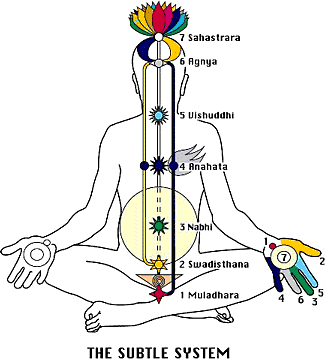|
Flower
Like
a Lotus, Know Your Chakras
By Sunihta Singh
In the process of individualisation, the psyche becomes 'whole'
when a balance is achieved between four functions: thinking,
feeling, sensing and intuiting. In the system of chakras we find
that each phase of energy is represented by an element -earth,
water, fire, air or ether. Each of the five vortices signifies a new
quality, and each is both an extension and a limitation of the
other.

For more details
on chakras visit
www.adishakti.org
At
the root centre,
Muladhara
is associated with the element earth, the quality being cohesiveness
and inertia. At this level, you may remain content, experiencing no
desire to change or to expand into any other state. At the same
time, just as the root of a tree implies the possibility of its
growth, the earth centre denotes an opportunity to expand the
awareness.
Similarly; the second chakra,
Swadhisthana, has the nature of its corresponding element,
water: an energy that tends to flow downward. The third chakra,
Manipura,
associated with the element fIre, has an upward consuming movement
like the flame. The fourth chakra,
Anahata,
associated with air, is characterised by a tendency to revolve in
different direction and to relate to other possibilities. Here
'air' is not 'vital breath' but the atmosphere, the immensity of
space and the conveyor of sound. The name of the chakra implies that
it emits a mysterious cosmic vibration, as of unstruck (Anahata)
sound. That is, sound beyond the realm of the senses. The fifth
chakra,
Visuddha, associated with ether, is like a vessel within which
all the elements mingle.
Once you have reached this stage, you begin to leave
Anahata
because you have succeeded in dissolving the union of material,
external facts with internal or psychic facts. So, the element ether
transcends the other elements. The presence of 'Om'
within the inner triangle of
Ajna, the
sixth chakra is a clear indication of 'origin', the beginning of all
things as also their end.
Om is the sonic
vibration from which all things emerge, and that into which they
will eventually be reabsorbed at the end of the cosmic cycle.
The seventh and last chakra has no associated sound, element or
colour. In the form of a pure lotus, the
Sahasrara
Chakra has a thousand petals, and is considered to be the
'illumination' of the mind. Just as the lotus grows in beauty and
radiance but has its roots in muddy clay; so too, must the human
transcend his lower nature and allow the true nature of his soul to
come forth and flower.
The process of becoming is not unilinear
, it is dialectical, with pulls and pushes at Every leval. The
Kundalini
energy does not shoot up in a straight line, at each stage of its
unfolding it unties the knots of different energies.
In tantric teachings the Purusha is first seen at the fourth chakra:
the Anahata.
Purusha is the essence of man, the Supreme Man. In the recognition
of feelings and ideas one 'sees' the Purusha. This is the first
inkling of a being within one's physical existence that is not
'oneself'. It is from this chakra that the purer feelings or essence
of mail unfolds.
But we must not make the mistake of ignoring the lower energies
because each proper unfolding of the human soul comes from
undergoing the transformation by going through each chakras in
sequence. How long you as an aspirant, stay at each chakra depends
on your attachment and karmic action.
Unfolding comes from awareness, pureness of being as in thoughts and
behaviour, meditation and devotion. Faith in God and your own self
is an essential requirement.
[Courtesy
TOI.250105
]
www.123himachal.com |

